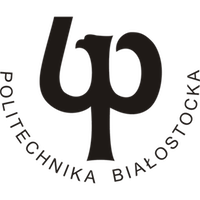
Bialystok University of Technology is the largest technical university in northeast Poland.

Brno University of Technology is a university located in Brno, Czech Republic. Being founded in 1899 and initially offering a single course in civil engineering, it grew to become a major technical Czech university with over 18,000 students enrolled at 8 faculties and 2 university institutes.
The Hamburg University of Technology is a research university in Germany. The university was founded in 1978 and in 1982/83 lecturing followed. Around 100 senior lecturers/professors and 1,475 members of staff work at the TUHH.
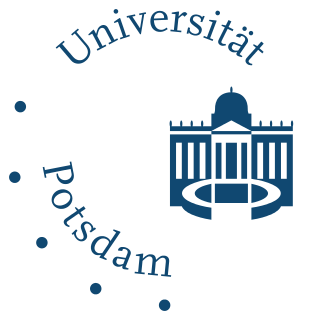
The University of Potsdam is a public university in Potsdam, capital of the state of Brandenburg, Germany. It is mainly situated across three campuses in the city. Some faculty buildings are part of the New Palace of Sanssouci which is known for its UNESCO World Heritage status.
Çanakkale Onsekiz Mart University is a Turkish public research university located in Çanakkale (Dardannelles) province and its surrounding towns. It is a member of the Balkan Universities Network, the European University Association (EUA), International Association of Universities (IAU), and the Thrace Universities Union. It hosted the World Universities Congress in 2010.

The Ho Chi Minh City University of Technology or VNU-HCM University of Technology, is a member of Vietnam National University, Ho Chi Minh City and a leading university in technology training and research activities in Southern Vietnam.
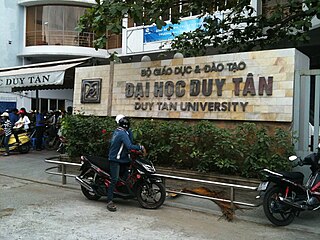
Duy Tân University is a private research university in Da Nang, Vietnam. The name derives from the Modernisation Movement, or phong trào Duy Tân, of 1906–1908. In 2019, the school was awarded the "First Class Labor Medal".
The Virtual Global University (VGU) is a virtual university offering online distance education or virtual education on the Internet.
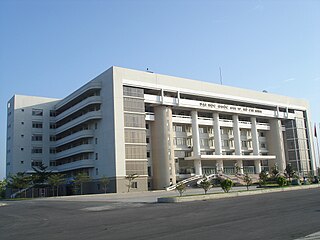
Vietnam National University, Ho Chi Minh City is a public research university system in Ho Chi Minh City, Vietnam. VNU-HCM is one of two Vietnam's national universities, the other one being Vietnam National University, Hanoi.
Ton Duc Thang University (TDTU) is a public university in Vietnam. The school belongs to the Vietnam General Confederation of Labor. The school operates under a fully autonomous mechanism. The school currently has a total of five campuses in four different cities including Ho Chi Minh City, Nha Trang, Bao Loc and Ca Mau.

Ho Chi Minh City International University, or VNU-HCM International University, is the first and unique English-medium public research university in Vietnam. Established in 2003, it is now becoming as one of the leading research powerhouse in Vietnam. The university is affiliated to the Vietnam National University, Ho Chi Minh City (VNU-HCM).

Saigon University (SGU) is a public university located in Ho Chi Minh City, Vietnam. The university offers over 30 degree programs through its academic faculties in 3 campuses, including law, business administration, information technology, applied mathematics, environmental science, biotechnology, electrical engineering, psychology, international studies, English language studies, Vietnam studies, library science and pedagogical subjects.
Vietnam Maritime University is a university in Haiphong operated by the Ministry of Transport. The university was established on 1 April 1956 as Haiphong Maritime University. As of 2007, this is the only maritime university in Vietnam. The university has over 1000 staffs, of which, 450 are faculty staffs. The university provides undergraduate and graduate education of shipbuilding, maritime navigation, nautical technology. It has a second campus in Vung Tau city.

University of the Bundeswehr Munich is one of two research universities in Germany at federal level that both were founded in 1973 as part of the German Armed Forces (Bundeswehr). Originally called Hochschule der Bundeswehr München the institution was supposed to offer civilian academic education for military officers. As an uncommon feature amongst German universities University of the Bundeswehr Munich unifies a more theoretical research university division and a more practical-oriented College of Applied Sciences branch. Today, the university has an increasing number of civilian and international students. The academic year at the university is structured in "trimesters" and not the usual semester, to offer intensive studies with more credit points per year. Very capable students can therefore achieve a bachelor's and a master's degree within less than four years, while this would usually require five years. University of the Bundeswehr Munich has well-established scientific research and forms part of two excellence clusters of the German government's university excellence initiative. The University of the Bundeswehr Munich is one of only very few campus universities in Germany.

FPT University is a private university in Vietnam. FPT University is a member of FPT Group and has campuses in Hanoi (main), Ho Chi Minh City, Da Nang, Can Tho and Quy Nhon.
The FH Aachen – Aachen University of Applied Sciences is one of the biggest Fachhochschulen in Germany with roughly 15,000 students, 250 professors, 470 contract lecturers, and 340 assistants. It is specialized in certain topical areas.

RMIT University Vietnam is the Vietnamese branch of the Australian research university the Royal Melbourne Institute of Technology, known in Australia as RMIT University. It has three campuses located in Ho Chi Minh City, Hanoi and Danang.
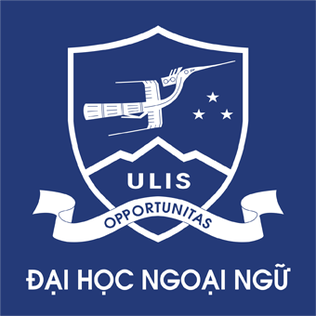
VNU University of Languages and International Studies, or Hanoi University of Languages and International Studies, is one of the six colleges that comprise Vietnam National University, Hanoi. The school offers undergraduate and graduate degrees in pedagogy and linguistic studies in Arabic, English, French, German, Japanese, Korean, Mandarin Chinese, Russian, Spanish and Thai. The college is located at VNU Cau Giay campus.
Hung Yen University of Technology and Education is a government-funded university in Hưng Yên Province, Vietnam.
University of Science and Technology of Hanoi (USTH) is an International Standard Public University in Hanoi founded in 2009 under the Intergovernmental Agreement between Vietnam and France signed on 12 November 2009.













